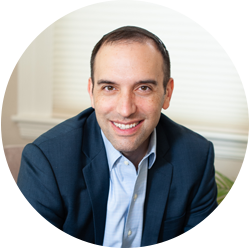Shalom Chaverim,
Earlier this week, over 150 members of our Greater Boston Jewish community participated in the Jewish Federations of North America’s first-ever virtual General Assembly, which brought together more than 10,000 people from across the country and around the globe. It was a chance to celebrate the collective impact we have made over the past year, including distributing $175 million in emergency funds — on top of the more than $1 billion raised and invested in the past year.
The last day of the conference featured sessions focused on areas of challenge and opportunity in North American Jewish life. I participated in a day-long workshop on strengthening and rebuilding a broad, diverse center during highly polarized times.
During the opening session, a colleague and long-time Federation leader framed the day with a powerful quote from Yeats’ poem, The Second Coming: “Things fall apart; the center cannot hold; Mere anarchy is loosed upon the world… The best lack all conviction, while the worst; Are full of passionate intensity.”
In conversations I have with members of our community as well with as my own family and friends, I hear fears and concerns that things are, indeed, falling apart. So many aspects of our lives and our world feel like they are getting more broken, rather than moving in the right direction. The toxicity of our moral and political discourse weighs heavily on us as we struggle just to carry out daily responsibilities.
Like many of you, I read articles commenting on the state of things that alternately add to and confirm our feelings of angst. Recent examples include David Brooks’ “America Is Having a Moral Convulsion,” The Wall Street Journal’s “Loathe Your Loved One’s Politics? Here’s Some Advice,” Bari Weiss’ “Stop Being Shocked,” and in this week’s The Times of Israel, “United States of Anxiety: New fears have American Jews questioning the future.”
There is a sense that, with the upcoming election, our future is hanging in the balance. We could wait days — if not longer — for results. And, perhaps more importantly, regardless of the outcome, we will have a long road ahead to start putting things back together.
An election can fuel the fire of polarization and drive people further into our different camps; or perhaps, it could trigger a process of local and national teshuva — introspection and self-reckoning — that calls us back to a sense of collective responsibility and shared commitment to a common good. Clearly, the health of our communities and the future of our democracy will require the latter. This is how I hope our Jewish community will respond, guided by Jewish values, respect for one another, faith in our country, and commitment to the ideals of our democracy.
Which brings me to the second half of the Yeats quote, “the center cannot hold.” Vibrant, resilient, diverse, inclusive communities and democracies require a large, strong center — a coalition of the reasonable who respectfully engage in principled arguments and who are committed to staying in relationships with the people with whom they most disagree (and sometimes even dislike). There is a reason why the foundational texts of the Jewish tradition are filled with thousands of pages of arguments, most of which are never even resolved!
To me, this is also the power of CJP and other values-based, non-partisan civic and cultural organizations that have served broad, diverse communities and stood the test of time.
But here’s the thing: A strong center cannot be based solely on pragmatism and avoidance of conflict, nor can it be values-neutral. Just because we are humble about our beliefs and open to other truth claims does not mean that we lack conviction or cede passion to those on either extreme. On the contrary, a strong center is a vessel for what the Jewish tradition calls makhloket l’shem shamayim — an argument for the sake of heaven — a passionate debate about our values and pursuit of what is true and good.
We can fervently disagree and give one another the benefit of the doubt at the same time. This culture of engagement honors the dignity of every human being regardless of orientation, gender identity, skin color, religion, socioeconomic status, or political persuasion — and is vigilant about the rights and the voices of everyone, especially those most often marginalized. We need to rebuild this kind of center like the Jewish People, our democracy, and our very lives depend on it.
In this spirit, I invite you to join us for a timely discussion this Sunday night with Harvard political philosopher Michael J. Sandel, who recently published a new book, The Tyranny of Merit: What’s Become Of The Common Good? This is an opportunity to learn and reflect together about our community’s roles and responsibilities as we engage with and help strengthen American democracy and our common good.
As we look toward this election and beyond, our work — our Jewish and civic responsibility — lets us continue building communities of learning and action that contribute positively to the healing, repairing, and restoring that will be so desperately needed in the weeks, months, and years ahead.
Shabbat Shalom,
Rabbi Marc Baker

About the Author
CJP President and CEO Rabbi Marc Baker is an educator, writer, and leadership mentor who is devoting his life to Jewish learning and building Jewish communities.
